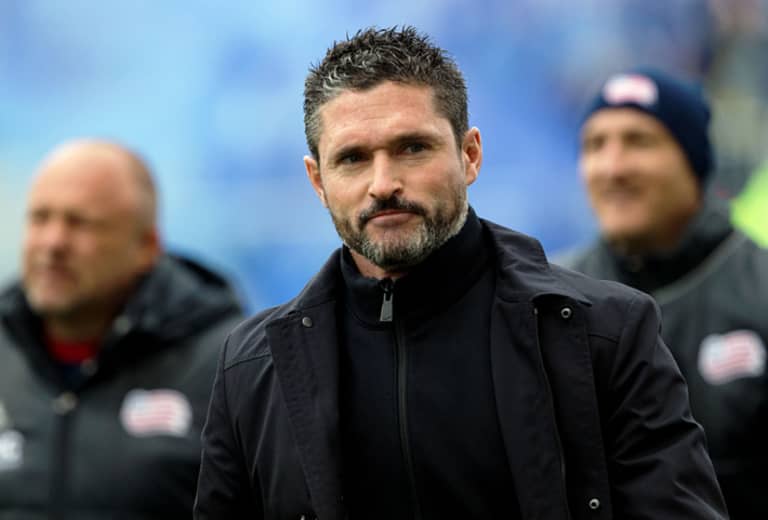BOSTON – It’s Monday morning and Tim Crawford is sitting in his office mulling over the New England Revolution's weekend match. But he’s not just relaxing, relishing in a win or heartbroken by a loss. He’s busy preparing a report that will help his coaching staff evaluate the team’s most recent performance.
It's one of two such reports that he will produce over the course of the week, with the other one detailing the Revolution’s upcoming opponent tendencies.
He will then discuss the content of those reports with team president Brian Bilello, general manager Michael Burns and the Revolution coaching staff, including head coach Jay Heaps.
We know that we are still in the nebulous stage of soccer analytics' evolution, but the Revolution are one of the few MLS teams that use this tool to help them on gameday.
“I think the trickiest thing for soccer right now, because the analytics are complicated and we are not a statistical sport like baseball, is really bridging that gap between the analytics and the head coach and everyone in between to make sure you are looking at things that make sense to the coaching staff that they can use,” Bilello told MLSsoccer.com at the MIT Sloan Sports Analytics Conference in Boston last month.
“It gives them actionable items, not just theoretical stuff that they are not going to use … It’s an iterative process, but your technical staff have to be involved and they have to believe in it, and has to be in a way that will help them make decisions. Otherwise, I’m not sure why you are doing it.”
Crawford, the analyst for the club, is not simply handing Heaps & Co. a report on models he worked or queries he ran. He is discussing with Bilello, Heaps and the rest of the technical staff what kinds of numbers that the team should be looking at, and how they can learn more about themselves and their opponents.
The people that Crawford is discussing these reports with are unlike most team presidents and head coaches. Bilello attended MIT and was a member of the school’s varsity soccer team. Before taking the job with the Revolution, he worked at a consulting firm in Boston for five years.
Heaps is not cut from the same cloth as many of his colleagues. A graduate of Duke, Heaps worked at Morgan Stanley as a private wealth manager after retiring from the game. He spent two years there while serving as a club ambassador and color analyst on the Revs' television and radio broadcasts, before returning to soccer full-time when he was named the Revolution's head coach in November 2011.
As you might expect, Crawford has a background in the field he currently occupies. He graduated from the University of Connecticut in 2007 with a BS in Mathematics and a minor in Statistics. He also happened to be a Revolution season-ticket holder from 2003 to 2008 before eventually getting hired by the team in 2012.
All the information that Crawford produces in concert with the technical staff means that the team doesn’t have to pore over every game from start to finish. Instead, they can pinpoint what they want to look at on video, making them more efficient in their scouting and preparations.
In addition to the two weekly reports that Crawford works on, he communicates with the technical staff and Bilello about bigger projects. This could come from a research paper someone else did, or just from watching a game.

Crawford alluded to one occasion where this kind of prep directly helped the Revs perform at a higher level than they were expected to.
“I was doing a project, trying to answer one of those questions, and it basically said the way certain teams were approaching a certain team was wrong and that we should do it the exact opposite way of what we were thinking,” said the Revs analyst. “We told the coaches that, and it wasn’t necessarily a high-risk game for us, because it was a road game and one that we weren’t expected to come away with points. I think they bought in that week, and it turned out really well for us. From then on, that kind of thing became a staple of our pregame prep.”
While we would all love to know the specifics of the game and circumstance that he is talking about, that's not something he or the team is interested in divulging. When Bilello was asked about specific examples when analytics helped the team, he had a simple response.
“There’s very specific things that we have used,” he said, “I don’t think many that I will share with you.”
So how do Bilello and Crawford make sure that everyone buys in to this tool? Crucially, as mentioned above, everyone is heavily involved. If something is produced that is not important or interesting to the coaching staff, it will likely go unused. This is why the technical staff help build the models that Crawford will use.
The value of the coaches' experience is tapped into by Bilello and Crawford on a regular basis, which allows them to produce data that the coaching staff can actually use in their evaluations and preparations.
“It’s not saying, 'here’s what we found and here’s what it means,' it’s saying, 'here’s what we found, and what do you think it means?' When you build the analytics that way, it’s something that the coaches help develop, and so he and his staff believe in it because they are the ones who helped get it from curiosity from an analyst to an actual step,” said Bilello.
So where do the Revolution fit in the hierarchy of MLS teams that are utilizing analytics? Bilello doesn’t really care to know. Instead, he focuses on improving the data his team is already using, and researching ways in which that data can continue to evolve.
“I think it is important that we try and devote a certain amount of time to research. Not just doing scouting reports and things like that, but actually looking at the game and trying to understand the game better and how you are successful in soccer,” he said.
“It’s really important to devote time every year to be thinking about research on the game analytically, because that’s where we’ll discover something that no one else has seen yet or discover something about our league that’s unique.”










